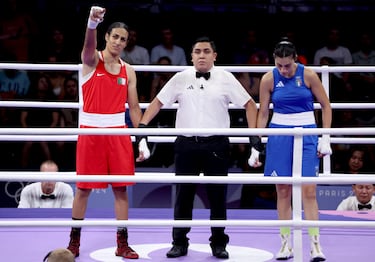Why was Imane Khelif allowed to compete at the Olympics?
A victory against Angela Carini in the women’s welterweight boxing sparked a largely misinformed debate in the sports world.

Imane Khelif is allowed to compete at the Olympics in the women’s boxing category because she is a female boxer who is representing her country, Algeria. She will fight for gold today, Friday 9 August.
Despite a shocking 46-second victory in the first round of the women’s welterweight boxing competition casting new focus on gender eligibility at the Olympics and across the world of sport, there is no debate.
Algerian Imane Khelif needed less than a minute to win her opening bout in Paris after her opponent, Italy’s Angela Carini, withdrew from the fight. But Khelif is not a transgender athlete. She was born as a female but has a disorder of sex development (DSD) which may give her XY chromosomes and testosterone levels similar to a male athlete.
Contrary to some claims online, Khelif has not undergone any procedure and her Algeria-issued passport lists her gender as female. The Olympic Organising Committee (IOC) have confirmed that her eligibility is not a “transgender issue”.

Khelif was disqualified from last year’s World Championships in India due to elevated levels of testosterone but the IOC’s own investigation reached a different conclusion.
What are the gender eligibility rules at the Olympic Games?
The Algerian’s heightened testosterone level did not breach the IOC rules to compete at the Games. Having been born as a female the IOC rules regarding the age of transition did not apply to Khelif. An investigation from the IOC found that she should be allowed to compete and her relatively modest competitive record (14 fights, nine wins, five losses) does not suggest an overwhelming physical advantage.
Khleif and Taiwan’s Lin Yu-ting were both admitted to the Olympic Games after failing to meet the International Boxing Association’s (IBA) eligibility criteria for the 2023 World Championships. Earlier this week IOC spokesperson Mark Adams made clear that the two athletes had satisfied every requirement to compete.
imane khelif had to sell scrap metal and couscous to afford training while lin yu-ting started boxing to protect her mom from domestic abuse. and yet there jk rowling sits on her pile of gold screeching nonsense
— molly taft (@mollytaft) August 2, 2024
Related stories
“I would just say that everyone competing in the women’s category is complying with the competition eligibility rules,” Adams said. “They are women in their passports and it is stated that is the case.”
The defeated Italian Angela Carini was frustrated with the manner of her loss on Thursday and Khelif’s rare disorder does highlight importance of gender eligibility requirements in ensuring a fair, safe competition. That the IOC and the IBA reached different conclusions shows how difficult this grey area can be, and illustrates the need for sensitivity when considering such significant decisions.


Complete your personal details to comment